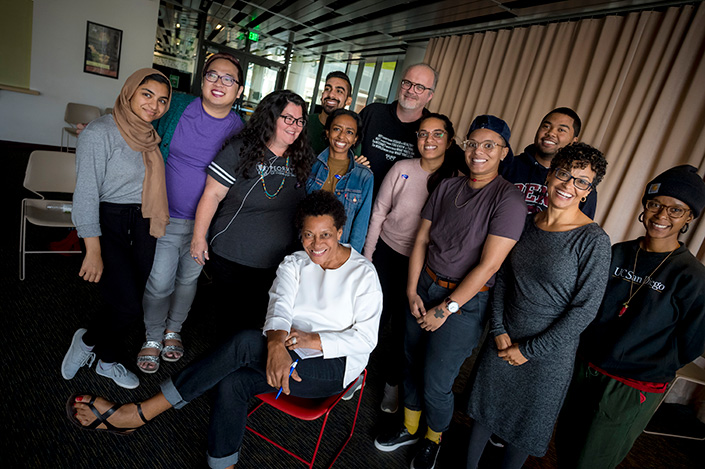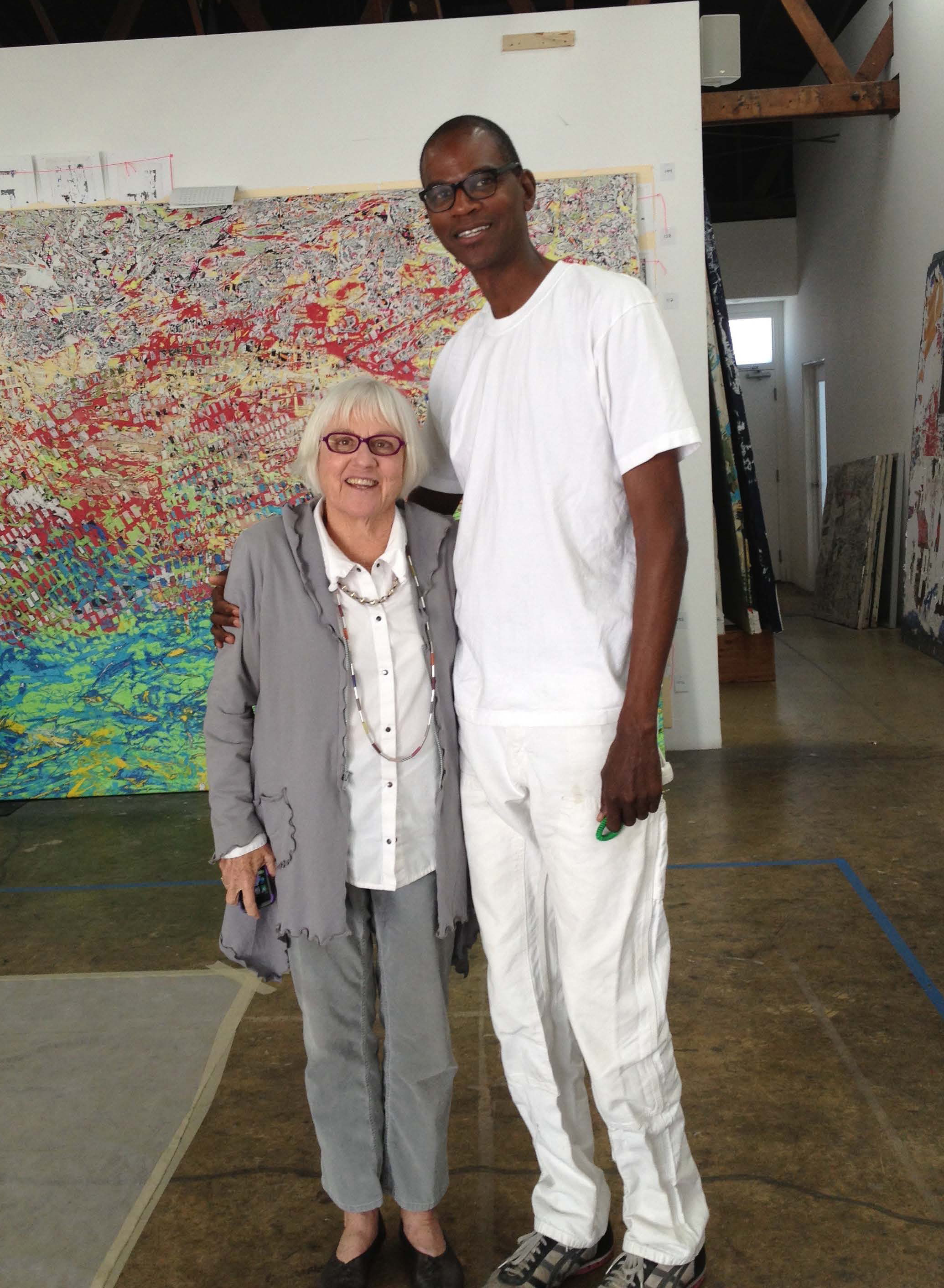National Medal of Arts Awarded to UC San Diego Alumna Carrie Mae Weems
Artist Mark Bradford, featured in the university’s public art collection, also honored
Story by:
Published Date
Story by:
Topics covered:
Share This:
Article Content
Carrie Mae Weems, a celebrated American artist and University of California San Diego visual arts alumna, was presented the National Medal of Arts by President Joe Biden at a White House ceremony on Oct. 21. Artist Mark Bradford, whose work is included in the university’s public art collection, the Stuart Collection, was also recognized.
The National Medal of Arts represents the highest honor given to artists and arts patrons by the federal government for outstanding contributions to the excellence, growth, support and availability of the arts in the United States. Honorees span visual art, music and film, with the 2023 and 2022 medal classes including creatives like artist and producer Melissa “Missy” Elliott, singer Selena Quintanilla (posthumously), filmmaker Steven Spielberg and more.
In his ceremony remarks, President Biden lauded recipients for breaking barriers, redefining culture, telling truths and building bridges that help us find meaning and purpose in the ordinary and extraordinary.
“I congratulate Carrie Mae Weems on this well-deserved recognition. Throughout her prolific career, she has shown us the power of the arts to explore the complexity of the human experience while offering stirring commentary on race, gender, class and identity,” said Chancellor Pradeep K. Khosla. “We are also proud to represent the work of medalist Mark Bradford in our public art collection, which is designed to enrich the cultural, intellectual and scholarly life of UC San Diego.”
Weems, who earned an MFA in Visual Arts at UC San Diego in 1984, is acclaimed as one of the most influential American artists working today. Over the past 40 years she has explored topics ranging from race and family relationships to gender and social hierarchy. Through photography, video, performance, installation and social practice she gives voice to those who have been silenced, shines a light on uncomfortable truths, reflects on the subtle nuances of relationships and opens conversation where tensions run high.
“As a provocative visual storyteller who is driven to create change, Carrie Mae exemplifies our mission to prepare students who are dedicated to the common good,” said Dean of the School of Arts and Humanities Cristina Della Coletta. “Her ability to capture beauty while simultaneously interrogating the systems that perpetuate inequality distinguishes her as one of the most important artists of our time.”
UC San Diego’s visual arts program, ranked fourth among public universities by U.S. News, invites students to explore new ways of seeing and promote an ethical future. The outcomes—as modeled by alumna Weems—are provocative reflections about humanity and our shared values. These dynamic projects can be experienced across the campus in galleries, concert halls, theatres and makerspaces, all part of the university’s ArtsConnect program.
Beautifying a messy world
“As a provocative visual storyteller who is driven to create change, Carrie Mae exemplifies our mission to prepare students who are dedicated to the common good. Her ability to capture beauty while simultaneously interrogating the systems that perpetuate inequality distinguishes her as one of the most important artists of our time.”
Most noted for her photographic works, Weems blends documentary, autobiographical and other storytelling techniques. For instance, in her iconic “Kitchen Table Series” (1990), she turns a small kitchen into a stage, casting herself as the main character in a fictional story. Each photograph shows Weems at a table with a dramatic overhead light beaming down. The characters she appears with–lovers, friends, children–change in each scene, depicting moments that are both universal and specific to the Black lives they imagine.
The New York Times described the project as the one that set her impactful career into motion. “It’s the series that made her career and inspired a new generation of artists who had never before seen a woman of color looking confidently out at them from a museum wall, and for whom Weem’s work represented the first time an African American woman could be seen reflecting her own experience and interiority in her art.”
Describing herself as a “deeply concerned artist who is certainly deeply engaged in the historical moment in which I live,” Weems also leads collective public art projects and multidisciplinary performances that speak to pervasive issues troubling our nation.
In 2016 she created “Grace Notes: Reflections for Now,” a multimedia performance that merges music, spoken word, dance and video to explore the meaning of grace in the context of Black oppression. Weems was inspired by former President Barack Obama singing “Amazing Grace” during his eulogy for Rev. Clementa Pinckney, one of the victims of the nine people killed at Emanuel African Methodist Episcopal Church in 2015. The work was performed at multiple venues, including the Kennedy Center for the Performing Arts.

Weems visited UC San Diego in 2018 to talk with undergraduate and graduate students from the Department of Visual Arts, as well as students in the university’s Black Studies Project. Photo by Erik Jepsen/University Communications.
“I know that I will be living with injustice for the rest of my life,” said Weems in a recent video interview with Smithsonian American Art Museum. “There is no relief in the deepest way. But there is resolve. And the resolve is to push for change, and to figure out the ways it needs to be articulated at this moment. Sometimes harshly, sometimes with joy, sometimes with laughter, sometimes with terror and tears–and sometimes with magic. But that is the thing that continues to drive me. This determination that I have a right to speak out against injustice and the way that it harms us all.”
Weems has been recognized for her work across the globe. Her accolades include a Hasselblad Award, a Bernd and Hilla Becher Prize, a MacArthur ‘Genius” grant, the U.S. State Department’s Medal of Arts, the Congressional Black Caucus Foundation’s Lifetime Achievement Award, among others. In 2014, the Guggenheim Museum presented a major retrospective of her work, “Carrie Mae Weems: Three Decades of Photography and Video.” Many of her pieces are in the collections of prestigious arts institutions, such as the Metropolitan Museum of Art in New York, the Museum of Contemporary Art Los Angeles, The Tate Modern in London, among others.
Illuminating our shared cultural history
A second celebrated visual artist connected to UC San Diego, Mark Bradford, was also among the newest cohort of National Medal of Arts honorees this week. A contemporary artist known for his large-scale, abstract paintings created out of paper, Bradford was commissioned to produce a work for UC San Diego’s Stuart Collection in 2018.
At 195 feet tall, his work is one of the tallest structures on campus. The sculpture is a monumental ode to the origins of today’s lightning-speed communications. Continuously signaling in Morse code, a lamp atop an industrial pole blinks silently, fast and slow, transmitting the first message ever sent by telegraph: “WHAT HATH GOD WROUGHT.” The conspicuous work stands prominently in Urey Plaza in Revelle College.
“We are delighted for Stuart Collection artist Mark Bradford to receive this prestigious honor,” said Director and Curator of the Stuart Collection Jess Berlanga Taylor. “Bradford’s work tells the story of those who are traditionally overlooked in history, and this medal cements his status as one of the most influential artists of our time. ‘What Hath God Wrought’ is a shining testament to his vision, and we are deeply grateful for his contribution to our collection and our campus.”
Bradford has exhibited internationally and garnered numerous honors, including representing the U.S. in the 2017 Venice Biennale with his solo exhibition, “Tomorrow is Another Day.” He was appointed to the American Academy of Arts and Sciences in 2019; received the U.S. Department of State’s Medal of Arts in 2014; and was awarded a MacArthur Fellowship Award in 2009.
His sculpture is one of 22 in the Stuart Collection, which commissions artists to create unique, site-specific works at the university–many of them fused to campus buildings or integrated into the landscape itself. The collection is free and open to all for both self-guided and docent-led tours.
Campus members and visitors are also invited to participate in a new public program series hosted by the Stuart Collection, which increases access to world-renowned artists and provides unique learning experiences. On Oct. 24-26, a multi-day public art and breathing project that focuses on mindfulness and community will be held at UC San Diego’s Epstein Family Amphitheater with artist Jeppe Hein. “Breathe with Me” emphasizes the importance of slowing down and recognizing the significance of mental health and self-awareness in our daily lives.
The Stuart Collection is part of ArtsConnect, a large network of art programs at UC San Diego led by the School of Arts and Humanities and the Office of the Vice Chancellor for Student Affairs and Campus Life. The university is a destination for cutting-edge contemporary art, award-winning theatre and and captivating music performances. Discover the galleries, concerts, plays, craft centers and more at ucsd.edu/arts.

Topics covered:
Share This:
You May Also Like
Stay in the Know
Keep up with all the latest from UC San Diego. Subscribe to the newsletter today.




